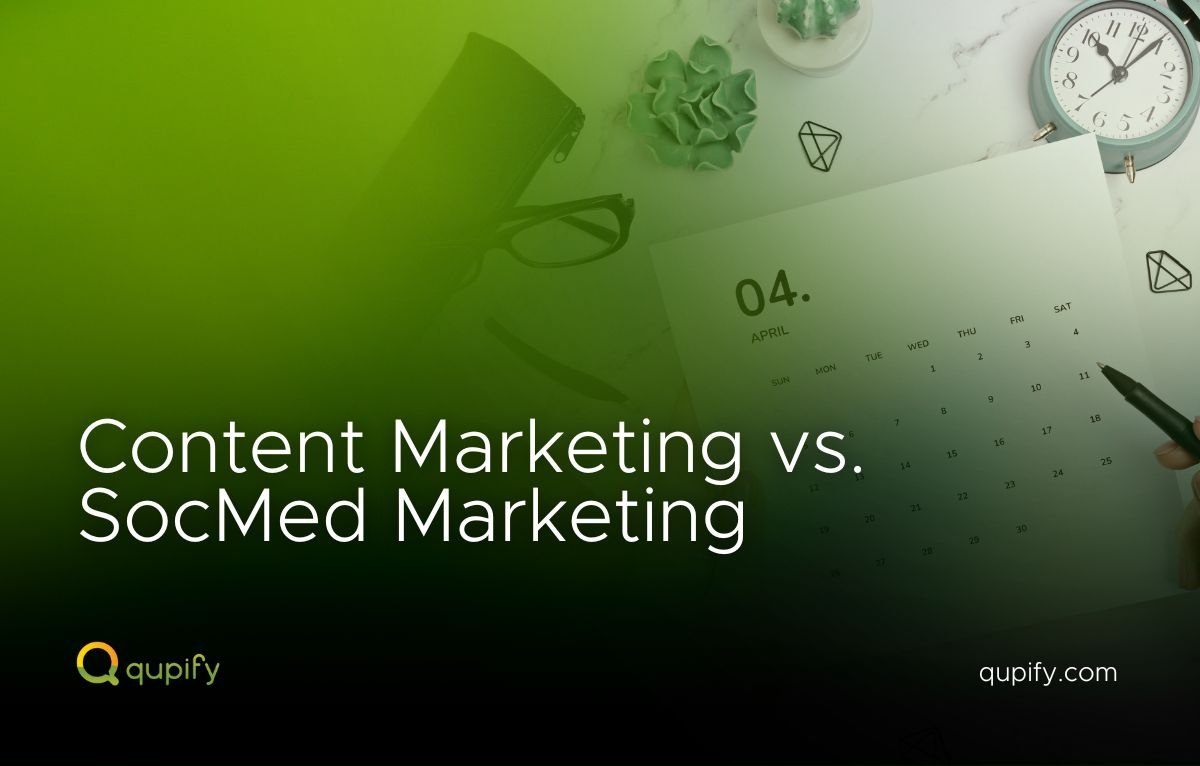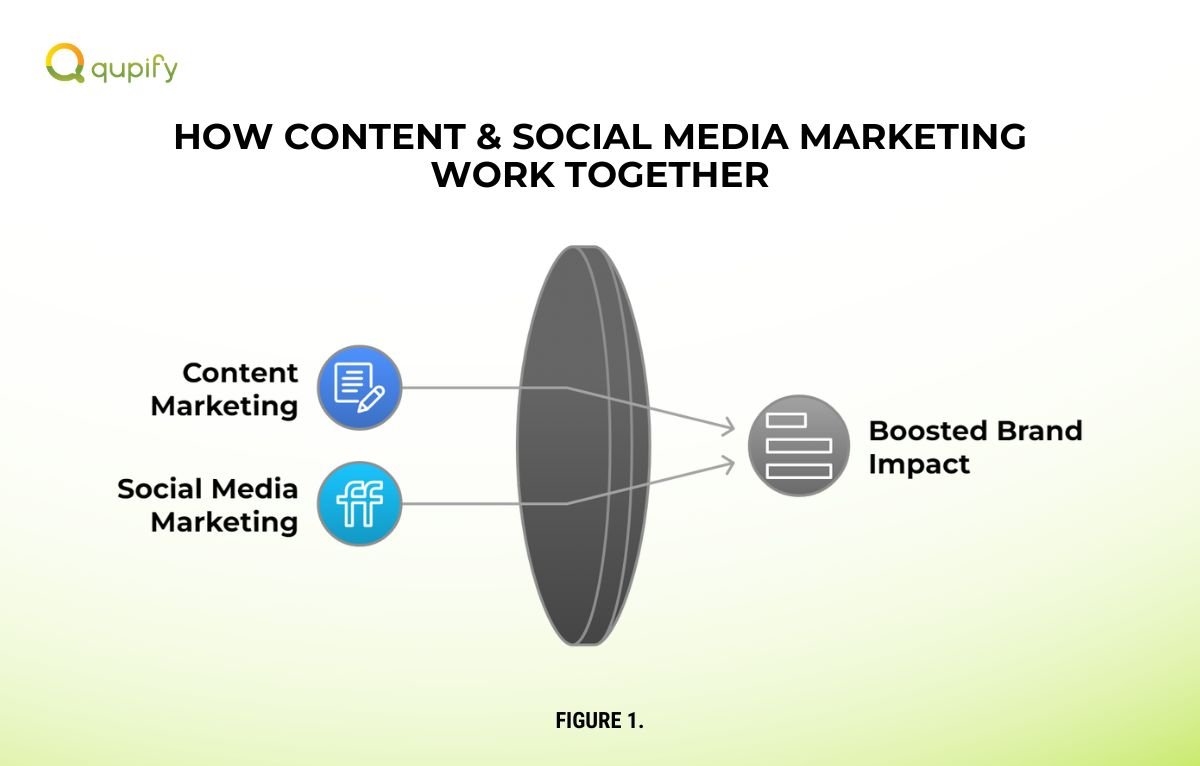Content Marketing vs. Social Media Marketing
Highlights
- Content marketing builds long-term trust with valuable, in-depth content
- Social media marketing boosts visibility through quick posts and real-time engagement
- Combining both strategies creates a cohesive and impactful marketing plan
Two of the most powerful approaches are content marketing and social media marketing. While both are designed to attract and engage people, they achieve this in different ways. Understanding these distinctions can help you choose the right strategy for your brand.
Do you want to build long-term trust through valuable content, or are you looking to capture immediate attention on social media? In this article, we’ll explore each strategy, highlight their differences, and show how combining them can help you grow your brand.

What is Content Marketing?
Content marketing is all about creating valuable and helpful content that attracts the right audience. It focuses on building trust and long-term relationships by offering solutions to problems through blogs, videos, newsletters, and more.
Instead of directly selling, content marketing educates and supports its audience, making them more likely to trust and engage with your brand.
For example, a blog offering home improvement tips can position your business as a helpful resource, encouraging readers to come back for more. This approach is ideal for businesses looking to establish themselves as leaders in their field and develop a loyal following.
What is Social Media Marketing?
Social media marketing focuses on using platforms like Facebook, Instagram, and TikTok to connect with your audience and promote your business.
This strategy involves creating engaging posts, running ads, and interacting with followers to build brand awareness and foster relationships.
Social media marketing is great for quick interactions and immediate visibility. For example, hosting a contest on Instagram can quickly attract more followers, while a Facebook ad can generate buzz for a new product. This strategy thrives on real-time engagement, making it perfect for businesses that want to create a lively, interactive presence online.
Differences Between Content Marketing and Social Media Marketing
Content marketing and social media marketing may share some goals, such as engaging audiences and driving growth, but they differ significantly in their approach, purpose, and execution.
Here are the key differences between content marketing and social media marketing.
1. Purpose
Content marketing focuses on providing value over the long term by building trust and relationships with your audience.
The goal is to educate, inform, or entertain through high-quality materials like blogs, eBooks, or videos that stay relevant over time.
On the other hand, social media marketing aims for immediate visibility and engagement. It is designed to capture attention quickly through posts, stories, or ads that encourage actions like likes, shares, or comments.
2. Content Focus
Content marketing emphasizes depth and quality, creating in-depth articles, videos, or guides that provide detailed solutions or insights.
This type of content is often evergreen, meaning it remains useful and relevant for a long time.
In contrast, social media marketing prioritizes short, engaging, and platform-specific content. Examples include quick Instagram reels, tweets, or Facebook updates that are designed to spark immediate interest but may lose relevance quickly.
3. Audience Interaction
Content marketing generally involves passive engagement, where the audience consumes content by reading, watching, or listening.
The interaction is subtle but meaningful, often leading to trust and loyalty over time.
Social media marketing, however, thrives on active interaction, encouraging users to like, comment, share, or participate in real-time discussions. This dynamic and interactive nature makes social media ideal for fostering a sense of community and instant feedback.
4. Distribution Channels
Content marketing relies on a variety of channels, such as company websites, email newsletters, and third-party platforms like YouTube or Medium.
These channels help deliver detailed content to the audience in ways that are not limited by specific platforms.
On the other hand, social media marketing operates solely on social media platforms like Facebook, Instagram, LinkedIn, and TikTok.
While this makes it highly visible, it also means your strategy is bound by the algorithms and rules of these platforms.

How Content and Social Media Marketing Work Together
Content marketing and social media marketing complement each other beautifully when used together. Social media platforms are excellent tools for promoting content, such as sharing blog posts to drive traffic to your website or posting clips of a longer YouTube video to reach a wider audience.
Likewise, high-quality content created for content marketing can provide depth to the conversations and interactions happening on social media.
This collaboration not only helps you reach more people but also ensures that your brand messaging is consistent across all channels. By combining both strategies, you can create a seamless and engaging experience for your audience.
To learn more about creating a seamless marketing strategy, check out this guide on integrating content and social media marketing. Start combining both strategies today to boost your brand’s impact!
Which One Should you Focus On?
The choice between content marketing and social media marketing depends on your business goals, audience, and resources. If your goal is to build long-term trust and improve search engine visibility, content marketing might be the better option.
For real-time engagement and boosting brand awareness, social media marketing could be more effective. Consider your audience, too—younger demographics may prefer Instagram or TikTok, while professionals might engage more with blogs or LinkedIn content.
Lastly, assess your resources; content marketing often requires more time and effort to create high-quality materials, while social media marketing needs frequent updates and quick responses. Most businesses benefit from using a mix of both strategies to achieve the best results.
Best Practices for Using Both Together
Combining content marketing and social media marketing can amplify your reach and impact. Start by aligning your content themes with your social media campaigns to maintain a consistent message.
Use a content calendar to plan and schedule your posts, ensuring regular engagement across both platforms.
Lastly, track performance metrics for both strategies to see what works and adjust your approach as needed. When integrated effectively, content marketing and social media marketing can create a cohesive and powerful strategy that strengthens your brand and connects with your audience on multiple levels.
Conclusion
Content marketing and social media marketing are two of the most effective ways to connect with your audience, and they work best when used together. Content marketing builds trust and authority over time, while social media marketing creates instant visibility and engagement.
By understanding their differences and integrating them into your strategy, you can achieve both short-term wins and long-term growth.
Take a closer look at your business goals, audience, and resources, and start creating a plan that uses the best of both worlds to grow your brand.
For a step-by-step guide on creating an effective content calendar, check out this detailed resource.



